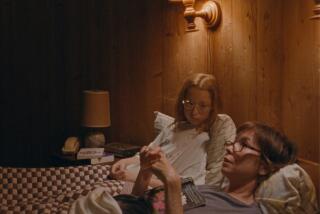BACK ALLEY PRODUCTION : ‘PEANUT’ IS CHILD’S PLAY, SAYS DIRECTOR
“Hopefully, after the first three minutes, you’ll lose sight of the fact that you’re watching an adult actor playing a kid--and actually see a kid,” said director Michael Arabian of Donald Margulies’ “Found a Peanut” (at the Back Alley).
“All of the (eight) actors have this ability of revealing the child within,” said Arabian, whose last project, the acclaimed “Scenes From American Life,” just closed at the Skylight. “When I cast them, that was what I was going for: to have them go back to when they were children, tap into that.”
The play, set in 1962 on a cement playing area behind a Brooklyn tenement, “has no real plot but a series of circumstances,” he said. “One of them is when they discover some money. Before, all the relationships are very pure, the choices simple and basic. But money changes that. Suddenly they start to get into greed, power trips.”
Another scenario finds a brother and sister reacting to the prospect of their mother about to start a job--meaning she won’t be there when they get home from school.
“They’re going to have to let themselves in with keys. And by having the keys they’re now responsible for the apartment. The girl doesn’t want that responsibility; she doesn’t want the keys. But whether she wants it or not, there’s going to be a change.”
For another child, there’s a traumatic introduction to violence and crime. Said Arabian: “The bullies intimidate and insult him, steal his ball. He’s never had anything stolen before, and he can’t understand how anyone could do that.
“So I tell the actors, ‘Remember the first time you had that kind of hurt, that violation, the first time you were robbed--when someone came in and violated your space. With the bullies, I know that, I lived it many times. Here, you can see how scarring it’s going to be to these kids, how they’ll never forget. Those things stay with you.”
Even more profound, he believes, is the blurring of the feelings and experience that separate the child from the adult. “Watching these children, you see that on their level their lives are just as complex as ours are now. And you realize we haven’t changed that much at all.”
For Arabian, many of the theatrical aspects also hit a chord of personal recognition.
“I grew up in apartment buildings (in Detroit),” he said, “and like these kids, I played a lot behind the complex, up and down the hallways and on the roof. When we finally moved into a house-- with a yard --well, I just loved it. I totally got into mowing the lawn and taking care of the yard, trimming the bushes and watering. It made my parents so happy.”
But the gardening mania was short-lived. Arabian soon discovered not only an ability to entertain, but “to express things to people in a way they could see and understand--things they wouldn’t necessarily have been able to see before.” In that regard, he is especially proud of his work with Salome Jens (and later Edith Fields) in last season’s production of “Request Concert” at the Cast.
“You don’t usually see plays about these kind of characters (a suicidal single woman),” he said. “People said, ‘Why do something like that? It’s not entertaining or theatrical.’ But it is , if presented correctly. It can be spellbinding--because it’s real, it’s true. And who hasn’t thought about suicide in their own lives? I think the most important thing I can do is deal with truth. Not shtick. Not visual imagery just for the sake of it. But truly get the audience involved. “
Arabian’s involvement depends on which particular hat he’s donning that day: director or actor. (After acting training in London, he’s appeared locally in “Romeo and Juliet,” “Angels Fall,” “School Talk” and “Strider.”)
Why the juggling act?
“As an actor,” he said gamely, “you try to audition for as many parts as possible: ‘Well, it might not be the greatest, but it’s a job.’ You hope it’ll be a wonderful experience. Usually it isn’t. You’re part of the writer’s or director’s vision, so you have to conform what you do (to their tastes). But you know, there’s no substitute for performing. As wonderful as directing is, it can never equal that.”
More to Read
Only good movies
Get the Indie Focus newsletter, Mark Olsen's weekly guide to the world of cinema.
You may occasionally receive promotional content from the Los Angeles Times.










